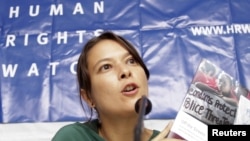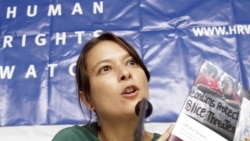“Human rights and democracy are foundational to our foreign policy because they are foundational to our polity, and because U.S. national interests will be most durably met by a world in which states are part of a stable rules-based order,” said Daniel Baer, Deputy Assistant Secretary for Democracy, Human Rights, and Labor. “That stable order can only be grounded on the durable peace that human rights and democratic governance deliver.”
“While . . . the region includes big and fast-growing economies,” said Mr. Baer. “We cannot forget that the region also includes many hundreds of millions of people who have yet to experience protections for their universal human rights.”
In this respect, in his 2011 speech in Canberra announcing the rebalance to Asia-Pacific, U.S. President Barack Obama spoke specifically to three ways in which the United States is exercising leadership on human rights.
“First, President Obama declared that ‘We help strengthen civil societies, because they empower our citizens to hold their governments accountable,’” Mr. Baer said. “We can be effective by standing up for civil society, throwing civil society actors a lifeline of support when they need it, and helping to preserve the space for them to make the case for change in their own societies.”
“Second . . . President Obama [affirmed] advancing ‘the rights of all people - women, minorities, and indigenous cultures – because when societies harness the potential of all their citizens, these societies are more successful, they are more prosperous and they are more just,’” Mr. Baer said.
“Finally . . . the President said that ‘we encourage open government, because democracies depend on an informed and active citizenry,’” said Mr. Baer.
“The Asia-Pacific region today is more free, more prosperous, and more respecting of internationally recognized human rights than at any point in history,” Mr. Baer said. “The region’s people, who have been for too long held back by poverty and oppression, are seeking out freedom and democracy in unprecedented numbers. But those changes have also highlighted that significant work remains to be done . . . Strong regional initiatives, and continued, serious engagement with regional governments will be key to ensuring a democratic, secure and stable Asia-Pacific.”
“While . . . the region includes big and fast-growing economies,” said Mr. Baer. “We cannot forget that the region also includes many hundreds of millions of people who have yet to experience protections for their universal human rights.”
In this respect, in his 2011 speech in Canberra announcing the rebalance to Asia-Pacific, U.S. President Barack Obama spoke specifically to three ways in which the United States is exercising leadership on human rights.
“First, President Obama declared that ‘We help strengthen civil societies, because they empower our citizens to hold their governments accountable,’” Mr. Baer said. “We can be effective by standing up for civil society, throwing civil society actors a lifeline of support when they need it, and helping to preserve the space for them to make the case for change in their own societies.”
“Second . . . President Obama [affirmed] advancing ‘the rights of all people - women, minorities, and indigenous cultures – because when societies harness the potential of all their citizens, these societies are more successful, they are more prosperous and they are more just,’” Mr. Baer said.
“Finally . . . the President said that ‘we encourage open government, because democracies depend on an informed and active citizenry,’” said Mr. Baer.
“The Asia-Pacific region today is more free, more prosperous, and more respecting of internationally recognized human rights than at any point in history,” Mr. Baer said. “The region’s people, who have been for too long held back by poverty and oppression, are seeking out freedom and democracy in unprecedented numbers. But those changes have also highlighted that significant work remains to be done . . . Strong regional initiatives, and continued, serious engagement with regional governments will be key to ensuring a democratic, secure and stable Asia-Pacific.”






